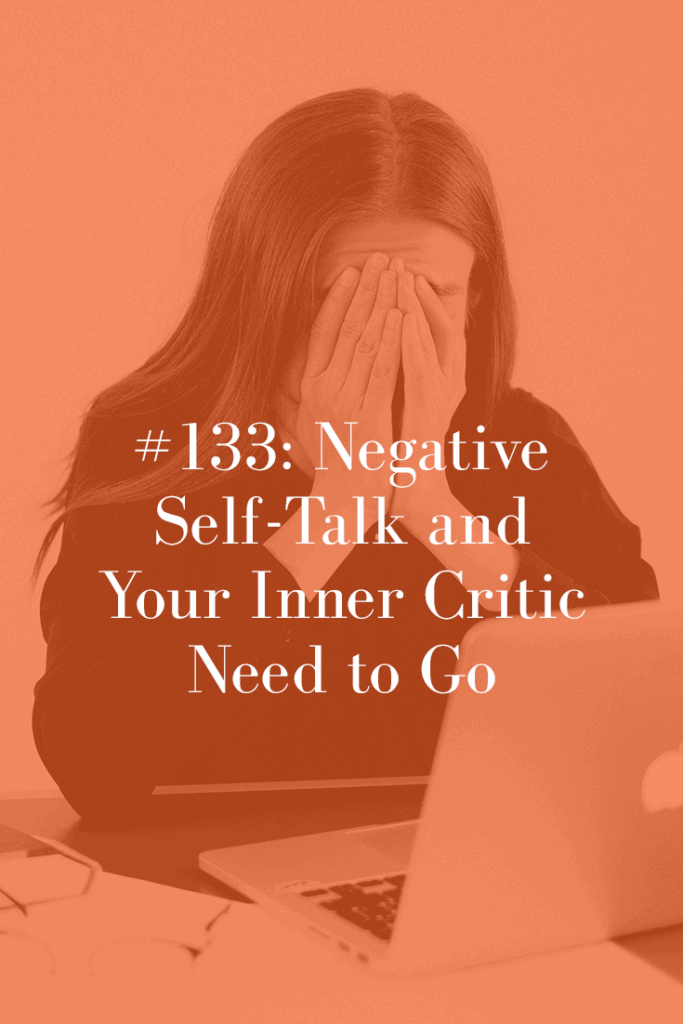
Is your inner voice an asshole? Do you routinely say things to yourself like:
- “Why can’t you ever speak up for yourself?”
- “Why do you always mess up?”
- “Yeah, the boss said I did a great job on that project, but she was just being nice”
- “What’s wrong with me?”
- “I’m just no good at (fill in the blank)”
- “I’m never going to be able to (fill in the blank)”
Today you’ll learn why you’ve got that asshole in your head and my top 3 ways to shut them up! AND I’ve got a free gift for you to really shift that voice in your head so stick around!
Negative self-talk is a shape shifter and shows up in a bunch of ways:
- Yeah buts
- Always/never or why can’t I ever, language
- Constant criticism
- Telling you you’re not good enough, there’s something wrong with you
- Basically being driven by fear of failure as opposed to driven from inspiration
Where Does My Inner Critic Come From?
Your inner critic is all about one thing really: shame. Yeah, you might think you speak this way to yourself because that’s how your mom or dad (or both!) spoke to themselves and it was the language they spoke to you – but it’s all from the same place. Shame.
There are Many Consequences of Negative Self Talk:
- You’re thinking people are being negative when they’re actually well-meaning so there are tons of misunderstandings and misconnections.
- Rumination and self-blame are linked to increased depression and anxiety.
- Focusing on negative thoughts leads to decreased motivation and feelings of helplessness.
- Limited thinking: Basically, the more you tell yourself you can’t do something, the more you believe it and your brain’s confirmation bias wants to prove you right so you find yourself less able to do things or finding them much harder than they need to be.
- Perfectionism: You believe that “great” isn’t as good as “perfect,” and that perfection is actually attainable! In studies, high achievers do better than their perfectionistic counterparts because they’re less stressed so can think more clearly and don’t waste time down rabbit holes. They don’t pick apart a completed project, trying to zero in on what they could’ve done better. Instead, they feel happy and satisfied with a job well done.
- Lots of relationship problems: When you’re constantly self-critical you can become needy and insecure as you look for others to tell you you’re OK. When partners or friends don’t show up in the way you think they should, you feel resentful and angry.
- This might sound simple, but a big problem with negative self-talk is that it means you’re not speaking positively to yourself. Research has shown that one of the biggest predictors of success is positive self-talk so now your inner critic is stopping you from reaching your true potential and goals.
- Your inner critics statements become self-fulfilling prophesies. If you’re always saying to yourself, “No one will ever love me” that’s likely what will show up. You might meet nice people but you either don’t notice them or think they’d never have anything to do with you. Or maybe you act so uncomfortable around them and present yourself as insecure, edgy, and uptight so they’re not interested. Your brain’s confirmation bias will drive you to prove yourself right.
Positive self-talk has been linked in the research to a host of benefits including:
- Living longer (and if you’re nice to yourself, you’ll want to)!
- Lower rates of depression and anxiety
- Stronger immunity (greater resistance to the common cold, for example)
- Better psychological and physical well-being
- Better cardiovascular health and reduced risk of death from cardiovascular disease
- Better coping skills when things are hard or stressful
Higher relationship satisfaction. The research shows stronger, more connected relationships that also have more longevity
How to Shut Up Your Inner Critic:
All of these tools are absolutely effective and will absolutely help you BUT (you knew there was a but) I can teach you all the great tools in the world and if you don’t remember to use them, they’re not going to help you! So, there are two things you’ve got to do first, before these tools:
1. You’ve got to be mindful throughout your day or you won’t realize your inner critic has been yapping at you! You’ve got to be able to notice the voice to stop it. Learning to make mindfulness a habit is your number one priority.
2. It’s super important to start your day off with positive momentum and not let your inner critic gain momentum all day. Starting your day off with a different voice in your head is paramount.
#1: Self-Distancing
Basically, you replace the word “I” with a pronoun like you, she, he or they when you’re talking about yourself, or you can just use your own name.
When you’re saying “I’m such an imposter” there’s no distance and it’s easy to get caught up in pain and panic. But when you talk about a situation in this third-person style, you’re self-distancing enough to engage the thinking part of your brain and you can see things more rationally and with some clarity because it can seem like it’s happening to someone else.
#2: Use More Accurate Language
As you hear yourself saying that you never know what to say or that you always clam up at work, stop yourself and get more real and accurate with your language. “It’s true that I’ve been having trouble talking to my boss lately, but I’ve certainly been in many meetings where I had no problem voicing my opinion.”
Notice catastrophizing or generalizing statements and break them down to more accurate, true statements. Your inner critic and negative self-talk offer you no room for growth or change. We end up talking ourselves into a corner where we’re stuck with no options. So, add the word “yet” to a sentence. “I haven’t figure this out yet.” “We haven’t been able to improve our relationship yet.” The word yet offers hope, possibilities, brainstorming and problem-solving instead of despair and feeling paralyzed.
#3: Be Loving and Kind to Yourself
I want you to start practicing loving-kindness meditation on the daily. Now stop rolling your eyes and telling me “I can’t meditate” because I’m going to make it SUPER easy for you and give you a link to a free gift to make this a no-brainer that’ll only take a few minutes of your time a day. I mentioned this in last week’s podcast too and here’s yet another reason to use it!
Let me explain a bit about what loving-kindness meditation really is and why it’s a research-backed, seriously effective tool for shutting up your inner asshole.
Basically, any loving kindness meditation focuses on developing feelings of compassion, love, kindness and warmth towards yourself and other people.
Research shows that Loving Kindness Meditation has a HUGE amount of benefits!
- It helps you shut off the inner critic and negative voice in your head and reduce self-criticism as well as depressive symptoms – can you say bingo?!
- It decreases negative emotions and increases positive ones!
- It increases feelings of social connection and decreases loneliness!
- It’s effective even in small doses; research shows you can literally do just a 10-minute meditation and feel more connected and happier
- It increases your compassion and empathy for yourself and others
- And it’s even been shown to decrease migraines and chronic pain!
I want you to listen my loving kindness guided meditation. Then, listen to it every day, for one week and watch the changes happen. As you become more peaceful, compassionate and loving, not only will your inner critic become muted, but your life will open up in new ways.
Resources:
Shame: The Silent Killer in Your Relationship
The Real Reason You Have Negative Thoughts (and 2 Things You Can Do About It)
What Anxiety Really Is and How to Deal with It (Grounding Techniques)
Loving Kindness Guided Meditation
Research Cited:
Thomas J. Scheff, “Shame in Self and Society,” Symbolic Interaction 26, no. 2 (2003): 239-262.
Gershen Kaufman, The Psychology of Shame: Theory and Treatment of Shame-Based Syndromes.
Barbara Fredrickson, Positivity: Groundbreaking Research to Release Your Inner Optimist and Thrive
Sharon Salzberg, Lovingkindness: The Revolutionary Art of Happiness












